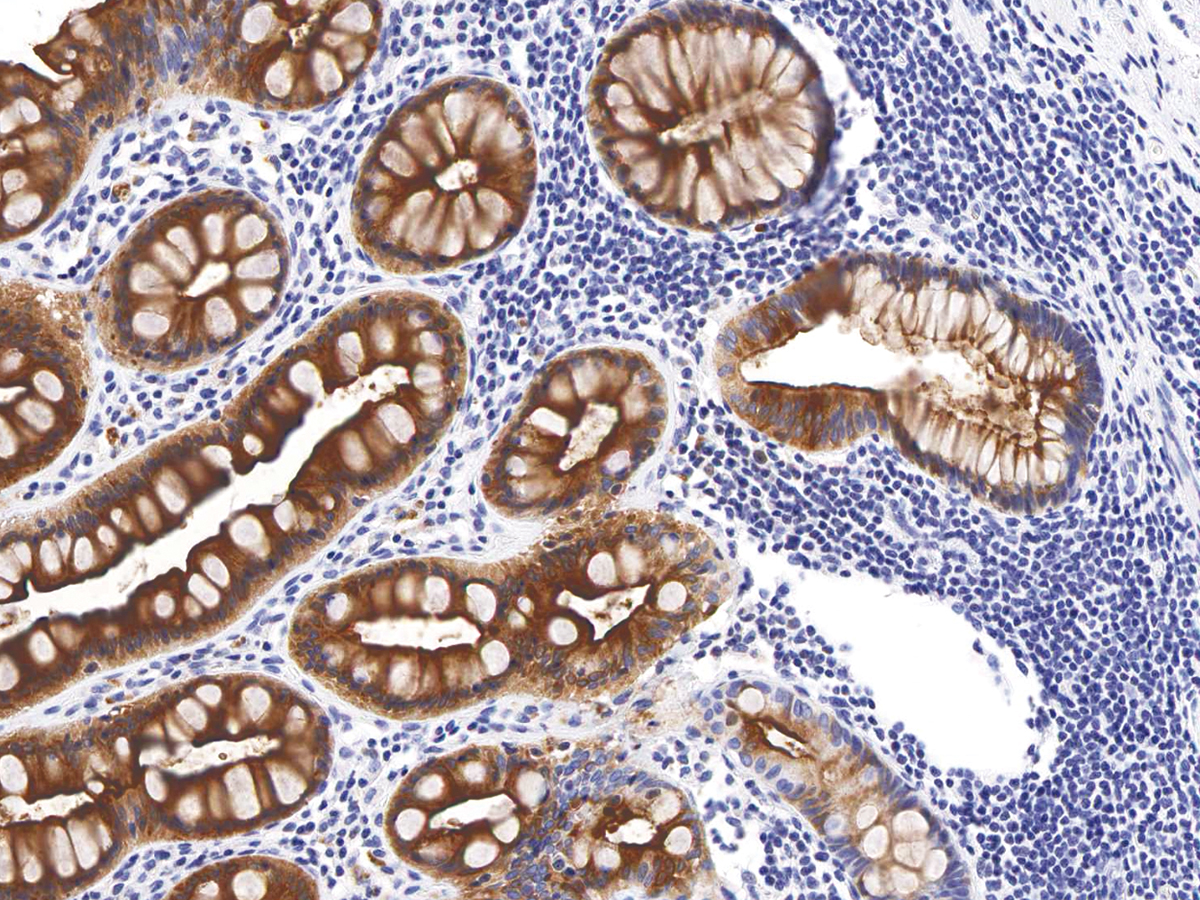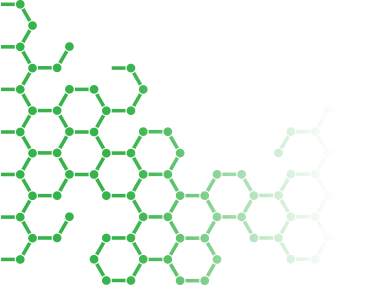CEA
Carcinoembryonic antigen (CEA) describes a set of glycophosphatidyl inositol and transmembrane cell-surface-anchored glycoproteins involved in cell adhesion, differentiation, anoikis, polarization, and tissue architecture. CEA staining, along with Calretinin, CK 5/6, D2-40, HBME-1, Napsin A, MOC-31, and Ber-EP4, is used to help differentiate between adenocarcinoma and mesothelioma. Staining with Anti-CEA is also suggested to be useful in identifying the origin of metastatic adenocarcinoma. CEA is an effective marker for adenocarcinomas of the lung, colon, stomach, esophagus, pancreas, gallbadder, urachus, salivary gland, ovary, and endocervix.
01
Product Specification
- Gene Name
CEA
- Catalog
0.1 ml, Concentrate : FP-A055-01
1 ml, Concentrate : FP-A055-10
7 ml, Predilute : FP-A055-70 - Source
Mouse Monoclonal
- Control
Colon Adenocarcinoma, Colon Mucosa
- Dilution Range
1:50 – 1:200
- Species reactivity
Human
- Data
- Application
IHC(P)
- Shipping Condition
Store at 2-8°C.
- Long Term Storage
Store at 2-8°C. Do not freeze.
- Datasheet
- Intended Use
For research use only
- Order Now
ProductCategory
JAK2
IDH2
BCL2
KIT
KIT Mutation Screen KitKIT Exon 11 Primer Set (A)KIT Exon 11 Primer Set (B)KIT Exon 13 Primer Set
MPL
COL1A1
COL1A1 Dual Color Break Apart FISH ProbeCOL1A1/PDGFB Dual Color Dual Fusion FISH Probe
KRAS
KRAS Mutation Screen KitKRAS Exon 2 Primer SetKRAS Exon 3 Primer SetKRAS Exon 4 Primer Set (A)KRAS Exon 4 Primer Set (B)
MDM2
PDGFB
PDGFB Dual Color Break Apart FISH ProbeCOL1A1/PDGFB Dual Color Dual Fusion FISH Probe
NRAS
NRAS Mutation Screen KitNRAS Exon 2 Primer SetNRAS Exon 3 Primer SetNRAS Exon 4 Primer Set (A)NRAS Exon 4 Primer Set (B)
CDKN2A
FGFR2
PIK3CA
PIK3CA/CEN 3 Dual Color FISH ProbePIK3CA Mutation Screen KitPIK3CA Exon 9 Primer SetPIK3CA Exon 20 Primer Set
CCND1
CCND1/IGH Dual Color Dual Fusion FISH ProbeCCND1 Dual Color Break Apart FISH ProbeCCND1/CEN 11 Dual Color FISH Probe
ALK
TP53
TP53/CEN 17 Dual Color FISH ProbeTP53 Mutation Screen KitTP53 Exon 8 Primer Set
FGFR1
FUS
ASXL1
1p36
FOXO1
DNMT3A
VHL
MYB
SF3B1
MET
ROS1
TET2
RET
ABL
BCR/ABL1 Dual Color Dual Fusion FISH ProbeABL Mutation Screen KitABL Exon 4 Primer Set (A)ABL Exon 4 Primer Set (B)ABL Exon 6 Primer Set (A)ABL Exon 6 Primer Set (B)
MED12
MYC
BIRC3
AKT3
PTEN
DDIT3
ETV6
BRAF
Real-Time BRAF V600 Mutation KitBRAF Mutation Screen KitBRAF Exon 15 Primer Set
PIK3CD
EGR1
EGFR
EGFR C797S Mutation Screen KitEGFR Mutation Screen KitEGFR Exon 18 Primer SetEGFR Exon 19 Primer SetEGFR Exon 20 Primer SetEGFR Exon 20 T790 Primer SetEGFR Exon 21 Primer SetEGFR/CEN 7 Dual Color FISH Probe
CALR
IGH
CCND1/IGH Dual Color Dual Fusion FISH ProbeBCL2/IGH Dual Color Dual Fusion FISH ProbeIGH Dual Color Break Apart FISH Probe
FLT3
PDGFRA
PDGFRA Exon 18 Primer SetPDGFRA Exon 14 Primer SetPDGFRA Exon 12 Primer Set
RUNX1
ETV6/RUNX1 Dual Color Dual Fusion FISH ProbeRUNX1/RUNX1T1 Dual Color Dual Fusion FISH Probe
HRAS
HRAS Mutation Screen KitHRAS Exon 2 Primer SetHRAS Exon 3 Primer SetHRAS Exon 4 Primer Set (A)HRAS Exon 4 Primer Set (B)
IDH1
PML
DNA methylation assay
Antibodies
MART-1 (Melan A) AntibodyCytomegalovirus (CMV) Antibodyc-Myc AntibodyClusterin/Apolipoprotein J AntibodyCTLA-4 AntibodySurvivin AntibodyStathmin AntibodyProgesterone Receptor Antibodyp57 kip2 Antibodyp21 Antibody AntibodyOct-4 AntibodyNF Kappa B/p50 AntibodyNapsin A AntibodyMSH6 AntibodyEBV LMP-1 AntibodyFlt-1/VEGFR1 AntibodyCD99 AntibodyCA 19-9 AntibodyBRAF V600E AntibodyAEG1 AntibodyCD56 AntibodyCD15/Leu-M1 AntibodyCEA AntibodyDOG1 AntibodyGLUT1 AntibodyGlycophorin A AntibodyHairy Cell Leukemia AntibodyhENT1 AntibodyMDR3 AntibodyMyogenin AntibodyN-cadherin AntibodyKBA.62 (Melanoma Associated Antigen) Antibodyp16 Antibodyp40 Antibodyp63 Antibodys-100 AntibodySOX2 AntibodySOX-11 AntibodyEstrogen Receptor AntibodyTTF-1 AntibodyBG8 LewisY AntibodyActin, Smooth Muscle AntibodyCD45R AntibodyVimentin AntibodyTIM3 AntibodyThyroglobulin AntibodyThymidylate Synthase AntibodyTFE3 AntibodyTau AntibodyTAG-72 AntibodySOX10 AntibodySALL4 AntibodyPSAP AntibodyPSA AntibodyPodoplanin AntibodyPMS2 AntibodyPD-L1 AntibodyPD-1 AntibodyPAX8 AntibodyPAX-5 Antibodyp504s Antibodyp53 AntibodyNerve Growth Factor Receptor (NGFR) AntibodyNanog AntibodyMUC6 AntibodyMUC5AC AntibodyMSH2 AntibodyMLH1 AntibodyLMO2 AntibodyKi-67 AntibodyKappa AntibodyIDH1 R132H AntibodyHER2/neu AntibodyGATA3 AntibodyFSH AntibodyFibronectinE-cadherin AntibodyCytokeratin 19 AntibodyCytokeratin 18 AntibodyCOX2Collagen Type IV AntibodyCDX-2 AntibodyCD138 AntibodyCD57 AntibodyCD45(LCA) AntibodyCD44 AntibodyCD5 AntibodyCD2 AntibodyBSEP AntibodyArginase-1 AntibodyAnnexin A1 AntibodyCA-125 Antibody
Plasmid Controls
Data Analysis
NGS Cancer Panels
NGS代檢服務Leukemia NGS Cancer PanelNon Small Cell Lung NGS Cancer PanelColorectal NGS Cancer PanelLiver NGS Cancer Panel
Service
甲基化DNA代檢服務NGS代檢服務ELISA代檢服務PCR代檢服務RT-PCR代檢服務RNA原位雜交代檢FISH代檢服務SNP客製化服務
FISH Probes
Chromosome 1Chromosome 2Chromosome 3Chromosome 5Chromosome 6Chromosome 7Chromosome 8Chromosome 9Chromosome 10Chromosome 11Chromosome 12Chromosome 13Chromosome 14Chromosome 15Chromosome 16Chromosome 17Chromosome 18Chromosome 19Chromosome 21Chromosome 22Chromosome X
Real-time PCR
Real-Time CYP2C19 Genotyping HRM KitReal-Time BRAF V600 Mutation Kit







